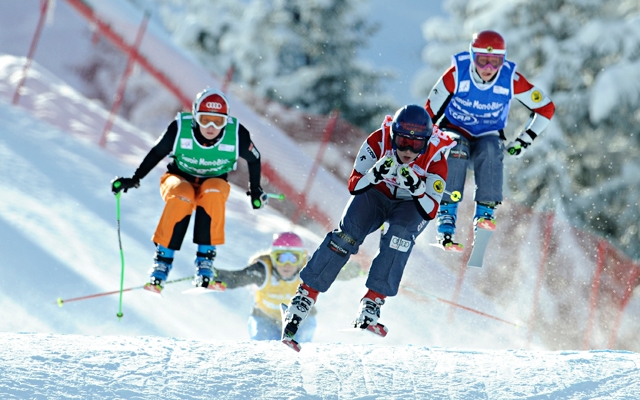Did watching the phenomenal athletes compete in the Winter Olympics inspire you to get into better shape? While it’s essentially a full-time job for these athletes, you can borrow elements from how they approach their training and apply it to your own fitness regimen. Take Zico Coconut Water-sponsored athlete Kelsey Serwa, for one. Her training won her the Silver Medal for ski cross in Sochi (a sport she describes as being like a more controlled version of roller derby on skis) trains. And if It got her to the podium, it can help you get into your best shape ever.
Change up your workouts
Many of us tend to gravitate towards a certain workout and it dominates our workout routine—so much so that we identify ourselves as a runner or a yogi, for example. But cross-training will boost your overall performance. Serwa trains six days a week, sometimes for seven hours a day, and her workouts include a wide variety. “Two days will be lower-body strength, and we’ll have upper-body based workouts, speed and agility, cardio, gymnastics, too,” says the Kelowna, B.C., native.
Make recovery a key part of your fitness regimen
Don’t overlook rest as an essential component of your training. “I’m a big fan of napping,” says Serwa. She tries to get eight hours of sleep a night, and more if she can. As for naps, she sets her alarm for 45 minutes so that she can get maybe a half hour of sleep, or at least just some rest with her eyes closed.
Find workouts you enjoy
“It’s too much fun to be a job,” says Serwa of her sport. “It’s more a lifestyle, and all of us amateur athlete do it because we love it.” When you find a sport you enjoy, then doing your workout is no longer a chore you have to force yourself to do regularly. If you hate hitting the gym, then it’s time to try something new that doesn’t bore you or fill you with dread.
Surround yourself with people who support your fitness goals
When standing on the podium, Serwa thought of everyone who helped her get there. “It was the most unbelievable thing to be there and here the Canadian national anthem play. It was a relief that all of the work, injuries, hours at the gym, saying no to parties in the middle of the week because I had to workout, it was all worth it,” she says. Serwa says it wasn’t just her who earned the medal, but her parents, friends, sponsors, too. “That support helped make me a full-time athlete,” says Serwa. Make your inner circle one that encourages your fitness pursuits, too—whether that’s a partner who can pick up more of the household duties when you’re training for a marathon, or friends who love the same sport who you can exercise with.
Keep a fitness journal and make a plan
Before a race, Serwa will draw up the course and break it down into zones and note what she needs to focus on in each area. Follow suit with a tactical plan of how you will achieve your fitness goals—even if it’s as simple as scheduling in your different workouts into your iCal. Also, keep a record of some sort of your workouts. “I have a big black book that I started before the Vancouver Olympics. I wrote in it before the race in Sochi and reflected on it afterwards, and I’ll write in it throughout the season if something really clicked and worked well for me. I’ll write it down and how I felt—if I ever get lost, it’s nice to go back and retrigger memories,” says Serwa.
Reward yourself
When you’re training so diligently, rewarding yourself will help keep you motivated. Serwa’s reward? Fitness testing. “A lot of athletes hate fitness testing, but I like to see the gains i’ve made. One thing we do is measure girth to see how much muscle mass we’ve gained. We’re putting in all this work, so it’s nice to see the results on paper—it’s rewarding in a sick, weird way,” laughs Serwa. (That said, she also admits to loving ice cream, which she indulges in occasionally as a reward.)
Eat a well balanced diet and hydrate well
“The body is like a race car and if you want it to perform at its maximum potential you have to put premium fuel into it,” says Serwa. She doesn’t follow a particular diet (“I’m not gluten- or sugar-free, for example,” she says), instead just eating well balanced and in moderation, and focusing on staying well hydrated. “I joke about dehydration being enemy number one, but it’s true—I’m so lethargic and tired if I’m dehydrated so I drink Zico to replenish electrolytes naturally; to give my muscles what they need to be able to get up after a four-hour workout and get ona bike for another three hours.”
Push through difficult workouts (and find a workout partner)
Even with a fitness regimen you love, there are going to be exercises that you despise, but you have to struggle though them because they will make you stronger. Serwa admits that there’s a power endurance workout she hates (“It’s super intense, it takes about one and a half hours and at the end of it you feel like throwing up,” she says) but she gets through it because she knows it’s one of their most beneficial workouts. And on those days she feels she just can’t face a workout? “If I want to take a day off, I know my team and competitors aren’t taking a day off,” says Serwa. This is when having a workout buddy can help you feel accountable to committing to fitness, and it might be helpful if you have a competitive streak with a focus on beating your own records.












